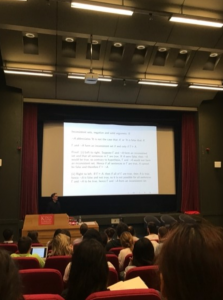
Having studied Philosophy and French for nearly 4 years, I am now in my final year and would like to discuss what I’ve learned about my subjects, plus what makes studying them at King’s so great. I often get asked why I chose to study these two subjects. While it’s easy enough for people to see why I wanted to learn a foreign language, explaining why I chose Philosophy can sometimes be a bit trickier. So here, I’m ready to dispel the myths and reveal what I wish people knew about studying Philosophy!

It’s not all about ‘the meaning of life’
Philosophy students or those with an interest in Philosophy will know that feeling. When a relative, friend, neighbor or whoever asks you what Philosophy actually is, and you scramble to come up with some woefully inadequate description before someone annoyingly interjects: “Oh, it’s just learning about the meaning of life”. This definition couldn’t be more wrong! In fact, you’d struggle to find any philosopher whose primary concern is the meaning of life. Have you ever wondered how words get their meaning? Or perhaps you want to explore whether or not democracy is a good system of government? Philosophy provokes such questions and strives for answers, debates. Whilst topics in the philosophy of religion or ethics may explore how humans should aim to live, there is far more to philosophy than meets the eye.
It’s relevant to the real world
I have often been questioned about why I chose to study something that isn’t deemed as ‘useful’ as other subjects, like perhaps biology or economics. I’m asked why I have opted for a subject that speculates about things that aren’t real, but yet again, this misconception of Philosophy could not be further from the truth. For instance, in political Philosophy, intellectuals have long debated whether countries have a right to impose border restrictions, while the emerging field of environmental ethics asks whether humans have a moral duty to protect the environment. If so, by what means should it be protected? And how can we use these arguments to influence policy? It’s not hard to see why these topics are so important, and these are just a couple of examples that highlight how Philosophy directly impacts the way we live. Besides, every supposedly ‘useful’ subject (whatever that means) is driven by the notion to somehow make sense of the world, and philosophy is no different.

It’s useful for gaining employment
For me, the best thing about studying Philosophy is that you acquire logical and discursive skills which you can put to use almost everywhere. It has not only helped me enormously in French, whether in debating literature or writing well-reasoned essays, but also outside of academia. Even if you aren’t thinking about life post-uni just yet, it’s good to know that studying philosophy is actually really useful. These days, many graduate job applications include a section where you have to assess the validity of a chain of reasoning, identify hidden assumptions or evaluate the persuasiveness of an argument. And considering that a Philosophy degree gives you years of training in these skills, you will have an advantage in terms of employability!
More information:
To explore the King’s Philosophy Department page, click here
To read blog posts about Arts & Humanities career options at King’s, click here
To read Iona’s blog post, ‘A day in the life of a Philosophy student’, click here

Leave a Reply